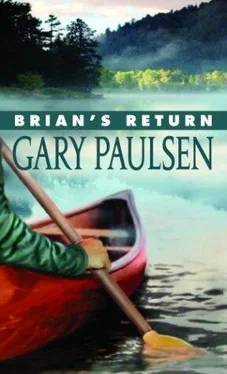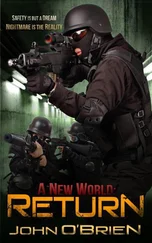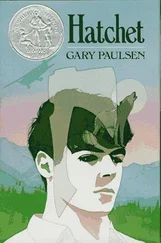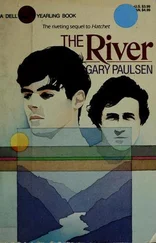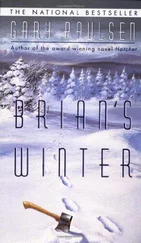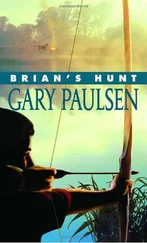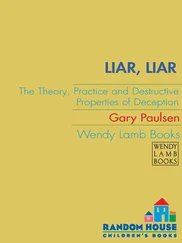Instead the bear hovered for a time — it seemed forever — and then came to a decision, let air gently from its nose in a long sigh, lowered slowly to all fours, turned and ambled away down the creek bed the way Brian had come, shuffling along through the shallow water without looking back.
Brian tracked it with the arrow and when it was obvious the bear was going to keep going he let the string go slowly forward — his arms were shaking from holding it back so long — and took a breath.
‘‘Good,’’ he said quietly, almost whispering. ‘‘It’s good. . my medicine is strong.’’
And he was half surprised to find that he was thinking the way Billy had spoken, almost in a song, and that as he had thought he had moved his right hand — the left still holding the bow with the arrow nocked — with his words, waving the medicine down from the sky and waving the bear away.
Good medicine.
Dear Caleb: I am where I belong and I belong where I am.
If there had still been something of his old life left in him — and there may have been just a faint part of it — it left with the bear, left when he looked over the broadhead at the bear’s heart and knew that he was not afraid because he was as good as the bear, as quick, as ready to do what he had to do. Because he knew he could kill the bear, knew he would kill the bear, he didn’t have to kill. He was even with the bear.
Even with the woods.
Even with his life.
He did not put the tent up that night but made a fire and had plain rice with salt — he didn’t even take fish — and then propped the end of his canoe upside down a couple of feet up on a limb, spread his bag beneath it and went to sleep. The mosquitos came for a short time; then the night cooled so that they left and he slept soundly.
The next morning he made tea, packed the canoe and worked ten hours on long lakes with two one-mile portages, making — according to the map — just under thirty miles, with thirty or so miles still to go to Williams Lake and the Smallhorns.
That evening he took fish to mix with his rice, again using a bare hook, and read some Shakespeare before it was dark — still Romeo and Juliet —having to reread it six or seven times, standing on the lakeshore speaking aloud out over the water before he thought he understood it.
Just before he finished he found himself speaking to an audience. Two otters came along the shore hunting and stopped to listen to him, floating on their backs in the water with their heads raised attentively as he read them a verse, then reread it:
O, mickle is the powerful grace that lies
In plants, herbs, stones, and their true qualities.
For naught so vile that on earth doth live
But to the earth some special good doth give. .
When he was finished they rolled over and dove and he did not see them again.
‘‘You could have clapped,’’ he called after them. ‘‘Or at least told me what mickle means. .’’
But they were gone.
Again he slept without the tent, under the canoe. That night it rained softly a bit but the canoe shed the water and he stayed dry and sometime toward morning he heard a noise, a rustling, and it awakened him and when he went back to sleep he dreamed of Billy.
It was a strange dream. Billy was there, in the woods, and he would point to something — a limb on a tree, a deer standing, a duck flying across the moon — and each time he would point at himself and then back to the scene and at the end he pointed at Brian, then at himself, then back at Brian and that was when Brian awakened and sat bolt upright, so suddenly that he hit his head on the inside of the canoe.
For a moment he sat there, wondering why he was awake. It was dark, though clear and well lighted by the moon, and there was a faint glow in the east. Nothing had disturbed the camp to awaken him, and then he remembered Billy and the dream.
It was there. Billy was his medicine. The deer, perhaps, but Billy as well, and it hit him that when he’d met Billy he was meeting himself years from now, an old man who looked carved in wood moving through and with the forest, being of and with the woods, and he decided that it wouldn’t be so bad a thing to be.
He arose and made a fire and had tea and a sugar cube and was packed and moving on the lake in the canoe before daylight. There was another series of long lakes and he could easily make Williams Lake and the Smallhorns that day.
He bit deep with the paddle, the canoe jumping ahead with his stroke, the pack tied in, his bow with a broadhead on the string lying in front of him, wearing only shorts except for the medicine hanging around his neck, burned brown now by the sun, one with the canoe and the lake and the morning and the air, and he was an hour across the lake when he realized he was not going to the Smallhorns.
It was a big map. There were many lakes and rivers to see, much more country to be in, and the Smallhorns would still be there later. He would find them when it was time to find them. He would head this way for a time, then perhaps move west with the sun.
Out ahead was the end of the lake, and out ahead of that another lake and out ahead of that the forest and out ahead of that his life. .
Just waiting for him to find it.
He leaned forward at the waist, slipped the paddle deep into the water and pulled back again, evenly, his arms and shoulders taking the load. The canoe came alive and seemed to leap ahead.
He would follow his medicine.
This is the final book about Brian, though someday I may do a nonfiction book about those parts of my life that were like Brian’s.
Once I knew the truth of the woods, which came to me about the time I wrote Hatchet, once I knew what happened, I knew I would write this book. It is perhaps even true that I always knew I would write this book, in a way before I wrote Hatchet or The River or Brian’s Winter.
A thing happens when you have been taken by the bush, by wilderness. Much is made, and rightly so, of the effects of post-traumatic stress disorder on people who have been in combat, and perhaps there is some of that in the effect that living in the wilderness has on a person — if such a thing can be good and not bad — for when a person has once been possessed by the wild it is not possible for him to be truly normal again.
I started hunting and trapping and fishing in the north woods of Minnesota when I was about eleven. Due to the difficult nature of my childhood I could not be home and spent much of the time — to the detriment of my grades — in the woods with either an old lemonwood bow and half a dozen homemade arrows or a worn old single-shot Remington.22 rifle that fired only half the time and never ejected right (I had to dig the expended cartridge case out with the tip of a pocketknife).
Virtually all that happens to Brian in these books has happened to me at some point or other in my life. I have been in two forced landings in light planes, though not nearly as severe as the crash Brian suffers in Hatchet (although that crash is based on a true incident). I have hunted large and small game extensively with a straight bow, have been attacked by moose several times, have had a bear ‘‘play’’ with me as the bear in this book does with Brian (it is a humbling experience to feel like prey), have had a doe jump into my canoe to get away from flies, have eaten what Brian eats, made fires and cooked the way he cooks, worked and slept beneath a canoe the way he does in this book, lived in lean-tos and holes in the ground and found and believe in my ‘‘medicine’’ (similar to Billy’s, mine is a crow).
Читать дальше
